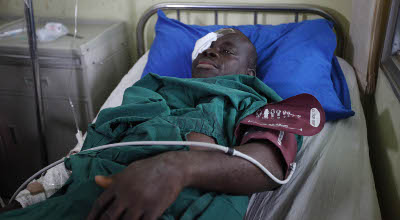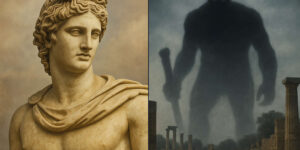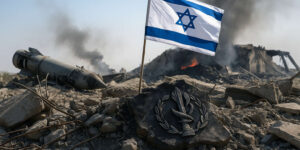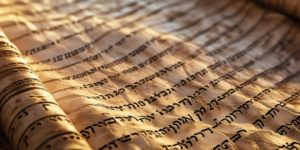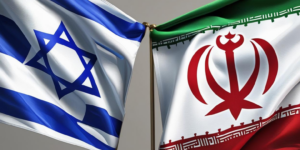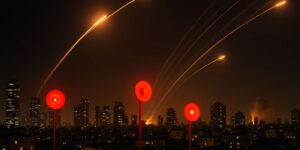Three Christians Killed in Muslim Raid on Nigerian Church
It was a few minutes before 10 at night when the staccato sound of gunfire interrupted the serene worship of St. Joseph’s Catholic Church near Zonkwa, Kaduna state. When the chaos ended, two women lay dead and 12 people were wounded.
The attack by a Muslim extremist gang in Tabak 1 village on Nov. 3 shattered the peace long known to Christians there, area sources said. The following night at about the same time, the gang raided another Christian community near Zonkwa, Kurmin-Bi, killing one Christian and injuring another.
While the Islamic extremist Boko Haram was responsible for several attacks that killed at least 150 people in Borno and Yobe states in Nigeria’s northeast over the weekend, Christians in Tabak 1 village in northern Nigeria’s centrally located Kaduna state said the church attack appeared to come from a Muslim gang not affiliated with the terrorist group.
The two women killed were Justina Zugwai Isaac, 28, and Hassana Luka, 39. A Roman Catholic seminary student who was leading worship at the time, 32-year-old Emmanuel Mallam, said it was a miracle that only the two women died in the attack.
Unaware that the attackers were hidden in the bushes around the church building, the two women were outside the building when they were shot, Mallam said. He had asked parishioner Julius Jacob, 38, to make closing remarks when the shooting began.
“As these Muslims began shooting, they shot Mrs. Justina Isaac, a mother of three, who had all the while been hanging around by the window outside the church listening to my teachings in the church,” he said. “And when she was felled by the bullets, the cry of her baby attracted another woman, Mrs. Hassana Luka, who came out of her house close to the church to find out what the problem was, only to be killed too.”
Before the attack, Mallam had asked all women and children in the church to return to their homes for safety reasons, but Zugwai Isaac had remained near the window listening to the teaching, he said.
“I asked the women and children to leave because it was getting late, and we had already had two hours of teaching on this very important topic,” he said. “So, the women and children left the church, and I and about 50 men stayed behind to round up our discussion on the topic.”
Mallam said he was leading a talk about the significance of the Eucharist in the church when the Muslim assailants, “who must have laid ambush around the church for a while,” opened fire into the church building.
“I was dazed and confused, as I have never experienced anything like this before,” he said. “All over I could see bullets flying around us with fire. I ducked and ran blindly, not knowing where I was running to, until I found a window and jumped out of the church. That was how I escaped being killed.”
Mallam said he fled as the firing continued, running to nearby Aduwan village to alert the community about the attack.
“While there, I phoned a fellow seminarian, Kelvin Dominic, whose older brother is military personnel and was in the village at the time,” he said. “Dominic in turn informed his soldier brother about the attack, and he too reported the incident to his military colleagues manning the numerous road-blocks in the area.”
Mallam said the soldiers evacuated both the injured and the dead to the St. Louis Catholic Hospital in Zonkwa.
The injured were identified as 8-year-old Shadrack Luka; Jacob Kazah; Jacob Achi; Patrick Markus; Anthony Luka; Timothy Jacob; Sunday Julius; Ishaya Jacob; Christopher Anthony; Joseph Jacob; Happy Ishaya (another woman also shot outside the church building); and Ayuba Dabo.
Mallam said the church has suspended both early morning and evening mass as his parishioners fear another attack.
“It appears that there is no government in Nigeria,” he said. “If not, how can Christians be slaughtered in northern Nigeria and the government is unable to stop this carnage?”
Ishaku Luka, village head of Tabak 1, told Compass that his people were peace-loving and have never had any conflicts with area Muslims.
“I wonder why we should now become the target of their attacks,” he said. “We are sad about this attack, as it has affected us negatively. I want to appeal to the Nigerian government to take immediate measures to halt these attacks by Muslims on Christians.”
Luka said one of the women killed, Hassana Luka, had recognized one of her attackers as a Muslim who had once lived in the area.
“She called his name as Ado Ali before she was killed, and Anthony, who was hidden nearby, heard her calling the name,” Luka told Compass.
In Kurmin-Bi, another predominantly Christian village near Zonkwa, eyewitness Bitrus Musa told Compass that the attack took place at about 10 p.m. on Nov. 4.
“Three Christian friends, Hassan Peter, Sunday Bayil, and Anthony Yariyet, had met at Yariyet’s house and were chatting when, suddenly, Muslim gunmen emerged from bushes around the house to attack them,” Musa said. “Hassan Peter was shot on the head, and he died instantly, while my brother, Sunday Bayil, was shot on his legs.”
Again soldiers were alerted, and they arrived to remove Peter’s body and the injured Bayil to the St. Louis Catholic Hospital.
Musa said there was no doubt that the assailants were Muslim extremists; he said the gang members phoned area residents on Saturday, warning Christians of another attack.
“They told us through a phone call that they will be returning again to attack us,” Musa said.
The Kaduna state assaults were similar to the guerrilla method Muslim extremists have used to attack Christian communities in Bauchi and Plateau states in Nigeria. They strike, kill members of a family or a group of Christians, and then withdraw, only to strike again in another community as military personnel are struggling to defend the previously attacked community.
Nigeria’s population of more than 158.2 million is divided between Christians, who make up 51.3 percent of the population and live mainly in the south, and Muslims, who account for 45 percent of the population and live mainly in the north. The percentages may be less, however, as those practicing indigenous religions may be as high as 10 percent of the total population, according to Operation World.



